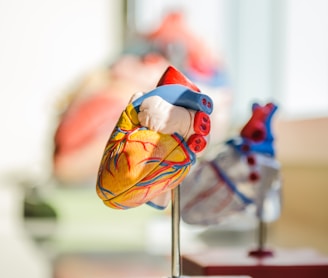Understanding Hypertension
Hypertension also called high blood pressure, is when the blood pressure against the arterial walls stays high over time. Blood pressure is a measurement of the force with which the blood is moving through the arteries.
3/13/20232 min read


What is Hypertension?
Hypertension also called high blood pressure, is when the blood pressure against the arterial walls stays high over time. Blood pressure is a measurement of the force with which the blood is moving through the arteries. Hypertension is a common illness that affects one billion people globally.
The two measures used to define hypertension are systolic blood pressure, or the pressure in the arteries when the heart is beating, and diastolic blood pressure, or the pressure in the arteries when the heart is at rest.
The American Heart Association says hypertension is when your blood pressure exceeds 130/80 mmHg. Blood pressure is measured in millimeters of mercury, or mmHg. Systolic blood pressure is 120/80 mmHg, and diastolic blood pressure is typically 80 mmHg while the heart pumps blood (the pressure in the arteries when the heart is resting).
Stage 1 (moderate) hypertension is defined as having a blood pressure reading between 130/80 and 139/89mmHg,
Stage 2 (severe) hypertension is defined as having a value of 140/90mmHg or higher.
Causes of high blood pressure
A variety of situations can cause high blood pressure.
Genetics
Lifestyle choices like as sedentary behavior
Stress
High sodium intake and fat-heavy eating patterns
Diabetes
Obesity
Kidney disease.
Common Symptoms of hypertension
Headaches
Blurred vision.
Nosebleeds
Tiredness
Light
Even if a person exhibits these symptoms, a doctor's blood pressure reading is the only way to be sure they have hypertension.
What role does high blood pressure play?
Hypertension is crucial because it dramatically raises the risk of severe diseases like heart attack, stroke, and kidney disease. For example, heart failure and heart disease are more likely to develop due to the pressure on the heart. Also, it can hurt the arteries, leading to plaque buildup and a higher risk of stroke.
Types of hypertension
The two subtypes of hypertension are primary hypertension and secondary hypertension.
Primary hypertension: This form of hypertension is the most common, and the cause is unknown. However, genetics, environmental factors like stress, and lifestyle elements like diet and exercise are considered to have an impact.
Secondary hypertension: This is attributed to an underlying medical condition like renal disease or an endocrine disorder.
Complications of uncontrolled blood pressure
Uncontrolled hypertension raises the risk of kidney disease, heart disease, heart attack, and other illnesses. Therefore, controlling hypertension is crucial to its treatment.
These include altering one's lifestyle by consuming less salt, exercising more, and controlling stress. The severity and underlying causes of hypertension will determine the best course of treatment.
Controlling Blood Pressure
In addition to changing lifestyle factors, doctors may advise medication to manage hypertension. Diuretics, beta-blockers, calcium channel blockers, and angiotensin-converting enzyme inhibitors are some drugs for treating hypertension. Surgery might be necessary for situations of severe hypertension. Controlling hypertension may involve making lifestyle changes, taking medication, or combining the two.
Making lifestyle changes like eating correctly, working out often, reducing stress, quitting smoking, and drinking less alcohol can all help lower blood pressure. In addition, drugs, including diuretics, beta-blockers, calcium channel blockers, and angiotensin-converting enzyme inhibitors, can all be used to treat hypertension.
High blood pressure presents a risk for conditions that can be fatal, such as heart disease, stroke, and kidney disease. High blood pressure is managed with medications and lifestyle changes.
Copyright © 2022 Medque Family Health NP PLLC
DBA Medque Health Center - All Rights Reserved.
ABOUT US
FOR PATIENTS
Email: info@medquehealthcare.com
SERVICES
FAQ
Phone: +1 8175874470
Address: 1420 N Cooper Street
STE 109. Arlington TX 76011
